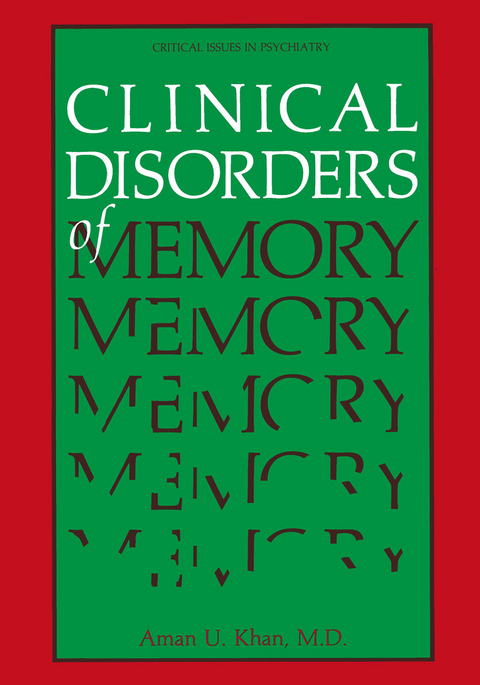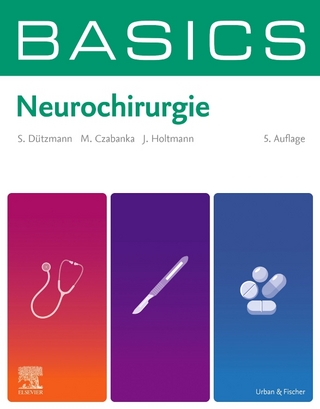
Clinical Disorders of Memory
Springer-Verlag New York Inc.
978-1-4684-5130-6 (ISBN)
Memory is essential for the retention of learning. In the presence of memory deficits, new learning is impaired and performance of previously learned habits deteriorates. What is the nature of memory? Where does it reside in the brain? What biological events are associated with the formation and retrieval of memory? These questions are explored in the first chapter of this volume. The answers are not final, but we have learned a great deal about memory processes during the past few decades. Memory is influenced by most of the pathological processes that influ ence the brain such as infection, trauma, cerebrovascular disorders, and met abolic and degenerative diseases. The nature and course of memory impairment are unique for each of the disorders and are fairly distinguishable. More than fifty conditions are known to cause dementia, which now affects several million Americans. In Alzheimer's disease, memory disorder predominates for two to three years before other intellectual functions are affected. Many neurological diseases, such as Huntington's disease, Friedreich's ataxia, and multiple sclerosis, are associated with progressive memory deficits. Forgetting is a problem that becomes progressively worse with age. Most individuals in their forties begin to experience some difficulty in quick recall of past events. By age sixty definite changes are evident in the process of registration, storage, and recall of memory. At this age the material that is to be remembered is processed more slowly, stored less firmly, and poorly recalled.
1. Nature of Memory.- A. Psychology of Memory.- B. Neurobiology of Memory.- C. Summary.- D. References.- 2. Memory Assessment.- A. Single Tests of Memory (Verbal).- B. Single Tests of Memory (Nonverbal).- C. Test Batteries for Memory.- D. Neuropsychological Test Batteries.- E. Questionnaires to Assess Memory.- F. Clinical Examination of Memory.- G. Specific Rating Scales and Inventories.- H. Summary.- I. References.- 3. Drugs Influencing Learning and Memory.- A. Introduction and Historical Overview.- B. Drugs Impairing Memory.- C. Drugs Facilitating Memory.- D. Summary.- E. References.- 4. Alcohol and Memory Impairment.- A. Social Drinking.- B. Acute Alcoholic Intoxication.- C. Chronic Alcoholism.- D. Summary.- E. References.- 5. Role of Neuropeptides in Memory.- A. Noradrenaline and Dopamine System.- B. Serotonergic System.- C. Cholinergic System.- D. Opioid Peptides.- E. Hormones.- F. Summary.- G. References.- 6. Memory in Degenerative Diseases of the Nervous System.- A. Alzheimer’s Disease.- B. Pick’s Disease.- C. Progressive Supranuclear Palsy.- D. Huntington’s Disease.- E. Wilson’s Disease.- F. Hallervorden-Spatz Syndrome.- G. Parkinson’s Disease.- H. Amyotrophic Lateral Sclerosis and Parkinsonian Dementia Complex of Guam.- I. Idiopathic Calcification of Basal Ganglia.- J. Spinocerebellar Degenerations.- K. Summary.- L. References.- 7. Memory in Cerebrovascular Disorders.- A. Chronic Ischemia of the Brain.- B. Transient Ischemic Disorder.- C. Large Cerebral Infarctions.- D. Multi-infarct Dementia.- E. Summary.- F. References.- 8. Memory in Chronic CNS Infections.- A. CNS Syphilis.- B. Chronic Viral Infections.- C. Subacute Sclerosing Panencephalitis.- D. Progressive Multifocal Leukoencephalopathy.- E. Transmissible Spongioform Encephalopathies.- F.Long-term Sequelae of Bacterial Meningitis in Children.- G. Summary.- H. References.- 9. Memory in Chronic Diseases.- A. Chronic Anoxia of the Brain.- B. Cardiac Diseases.- C. Lung Diseases.- D. Anemias.- E. Chronic Renal Failure.- F. Chronic Liver Diseases.- G. Fluid and Electrolyte Disturbances.- H. Endocrine Disorders.- I. Summary.- J. References.- 10. Memory in Head Trauma.- A. Severity of Injury.- B. Focal versus Diffuse Brain Damage.- C. Nature of Disability.- D. Recovery of Physical and Mental Functions.- E. Memory Disorders from Head Trauma.- F. Recovery of Memory.- G. Nature of Impaired Memory in Head Trauma.- H. Summary.- I. References.- 11. Functional Disorders of Memory.- A. Memory Functions in Depression.- B. Memory Functions in Schizophrenia.- C. Memory Dysfunction in Autistic Children.- D. Memory Impairment in Dissociative Disorders.- E. Other Dissociative Disorders.- F. Dream Memory and Dream Amnesia.- G. Hypnosis and Memory Dysfunctions.- H. Memory Loss Induced by Electroconvulsive Therapy.- I. Summary.- J. References.- 12. Memory Changes with Aging.- A. Psychological Aspects of Memory Changes with Aging.- B. Other Factors Affecting Memory in the Elderly.- C. Biological Aspects of Aging and Memory.- D. Summary.- E. References.- 13. Treatment Strategies for Memory Disorders.- A. Pharmacological Treatment.- B. Memory Skill Training.- C. Psychiatric Treatments.- D. Environmental and Reality Orientation Program.- E. Other Therapies.- F. Summary.- G. References.- Author Index.
| Reihe/Serie | Critical Issues in Psychiatry |
|---|---|
| Zusatzinfo | 284 p. |
| Verlagsort | New York, NY |
| Sprache | englisch |
| Maße | 178 x 254 mm |
| Themenwelt | Sachbuch/Ratgeber ► Gesundheit / Leben / Psychologie |
| Sachbuch/Ratgeber ► Natur / Technik ► Garten | |
| Medizinische Fachgebiete ► Chirurgie ► Neurochirurgie | |
| Medizin / Pharmazie ► Medizinische Fachgebiete ► Geriatrie | |
| Medizin / Pharmazie ► Medizinische Fachgebiete ► Neurologie | |
| Medizin / Pharmazie ► Medizinische Fachgebiete ► Psychiatrie / Psychotherapie | |
| Naturwissenschaften ► Biologie | |
| Sozialwissenschaften ► Soziologie | |
| ISBN-10 | 1-4684-5130-8 / 1468451308 |
| ISBN-13 | 978-1-4684-5130-6 / 9781468451306 |
| Zustand | Neuware |
| Informationen gemäß Produktsicherheitsverordnung (GPSR) | |
| Haben Sie eine Frage zum Produkt? |
aus dem Bereich


